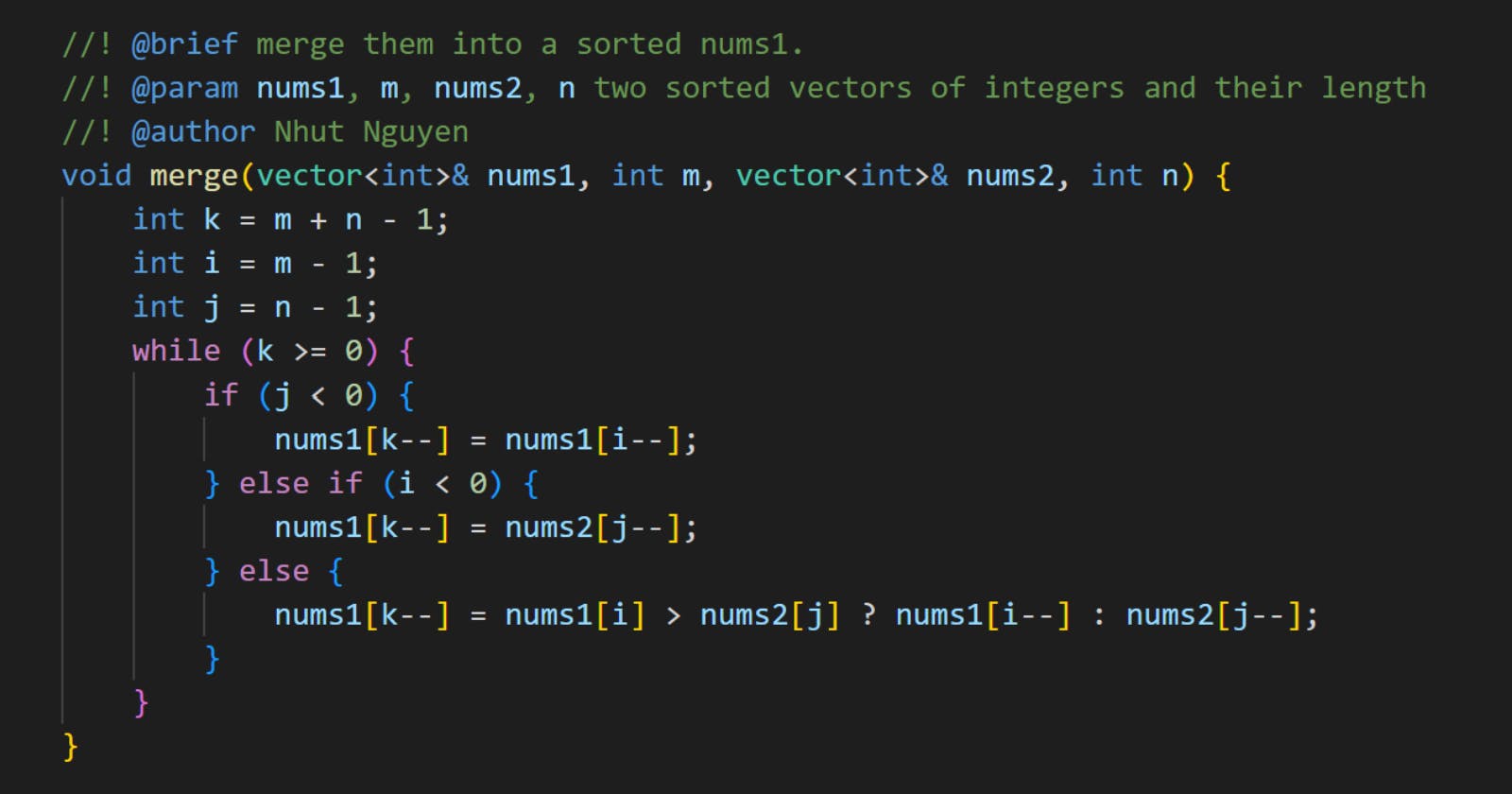Problem statement
You are given two integer arrays nums1 and nums2, sorted in non-decreasing order, and two integers m and n, representing the number of elements in nums1 and nums2 respectively.
Merge nums1 and nums2 into a single array sorted in non-decreasing order.
The final sorted array should not be returned by the function, but instead, be stored inside the array nums1. To accommodate this, nums1 has a length of m + n, where the first m elements denote the elements that should be merged, and the last n elements are set to 0 and should be ignored. nums2 has a length of n.
Example 1
Input: nums1 = [1,2,3,0,0,0], m = 3, nums2 = [2,5,6], n = 3
Output: [1,2,2,3,5,6]
Explanation: The arrays we are merging are [1,2,3] and [2,5,6].
The result of the merge is [1,2,2,3,5,6] with the underlined elements coming from nums1.
Example 2
Input: nums1 = [1], m = 1, nums2 = [], n = 0
Output: [1]
Explanation: The arrays we are merging are [1] and [].
The result of the merge is [1].
Example 3
Input: nums1 = [0], m = 0, nums2 = [1], n = 1
Output: [1]
Explanation: The arrays we are merging are [] and [1].
The result of the merge is [1].
Note that because m = 0, there are no elements in nums1. The 0 is only there to ensure the merge result can fit in nums1.
Constraints
nums1.length == m + n.nums2.length == n.0 <= m, n <= 200.1 <= m + n <= 200.-10^9 <= nums1[i], nums2[j] <= 10^9.
Follow up: Can you come up with an algorithm that runs in O(m + n) time?
Solution 1: Store the result in a new container
Code
#include <iostream>
#include <vector>
using namespace std;
void merge(vector<int>& nums1, int m, vector<int>& nums2, int n) {
vector<int> result;
int i = 0;
int j = 0;
while (i < m || j < n) {
if (j == n) {
result.push_back(nums1[i++]);
} else if (i == m) {
result.push_back(nums2[j++]);
} else {
result.push_back(nums1[i] < nums2[j] ? nums1[i++] : nums2[j++]);
}
}
nums1.swap(result);
}
void printResult(vector<int>& nums1) {
cout << "[";
for (int n : nums1) {
cout << n << ",";
}
cout << "]\n";
}
int main() {
vector<int> nums1 = {1,2,3,0,0,0};
vector<int> nums2 = {2,5,6};
merge(nums1, 3, nums2, 3);
printResult(nums1);
nums1 = {1};
nums2 = {};
merge(nums1, 1, nums2, 0);
printResult(nums1);
nums1 = {0};
nums2 = {1};
merge(nums1, 0, nums2, 1);
printResult(nums1);
}
Output:
[1,2,2,3,5,6,]
[1,]
[1,]
Complexity
Runtime:
O(m + n), wherem + n = nums1.length, n = nums2.length.Extra space:
O(m + n).
Solution 2: Reassigning nums1 backward
Code
#include <iostream>
#include <vector>
using namespace std;
void merge(vector<int>& nums1, int m, vector<int>& nums2, int n) {
int k = m + n - 1;
int i = m - 1;
int j = n - 1;
while (k >= 0) {
if (j < 0) {
nums1[k--] = nums1[i--];
} else if (i < 0) {
nums1[k--] = nums2[j--];
} else {
nums1[k--] = nums1[i] > nums2[j] ? nums1[i--] : nums2[j--];
}
}
}
void printResult(vector<int>& nums1) {
cout << "[";
for (int n : nums1) {
cout << n << ",";
}
cout << "]\n";
}
int main() {
vector<int> nums1 = {1,2,3,0,0,0};
vector<int> nums2 = {2,5,6};
merge(nums1, 3, nums2, 3);
printResult(nums1);
nums1 = {1};
nums2 = {};
merge(nums1, 1, nums2, 0);
printResult(nums1);
nums1 = {0};
nums2 = {1};
merge(nums1, 0, nums2, 1);
printResult(nums1);
}
Output:
[1,2,2,3,5,6,]
[1,]
[1,]
Complexity
Runtime:
O(m + n), wherem + n = nums1.length, n = nums2.length.Extra space:
O(1).
References
Thanks for reading. Feel free to share your thought about my content and check out my FREE book “10 Classic Coding Challenges”.

